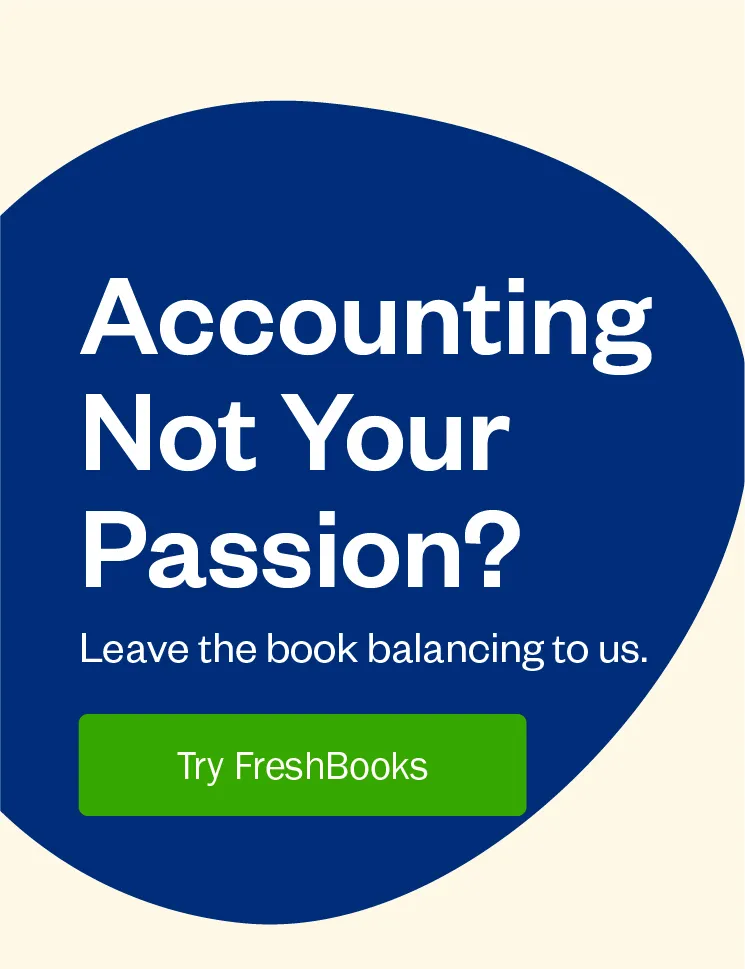A simple guide to help you go from "what are income taxes" to being tax time ready year-round. You'll be filing freelancer taxes with ease in no time.

Death and taxes, amirite? Nothing in life is as certain as these 2 things, and when it comes to paying taxes, you can do a lot to make them as painless as possible.
Yes, even in Canada, freelancers are required by law to file income taxes, however lbittle they earn. Think the Canada Revenue Agency (CRA) won’t notice you and let it slide? Maybe, but if you’re caught not declaring freelance income and subsequently paying taxes, you could open yourself up to substantial penalties and fines. The CRA calls this “underground income.” They dedicate a large portion of their resources to finding those who don’t declare their additional income.
OK, so that intro was a little negative, so here’s the good news: Filing income taxes as a freelancer is generally pretty easy. Below is a simple guide to help you go from “what are income taxes” to being ready year-round and easily filing taxes.
Table of Contents
1. Should You Register as a Business?
When you start out, it’s easy to get excited about your work and just put admin, accounting, business registration, and the like aside while you’re serving customers and making it rain 💰💰💰. However, there are a few things you really shouldn’t leave until ‘later,’ and becoming a registered business might be one of them.
You should first decide as a small business owner if you’ll operate using your name or a business name. If you’re just going to operate under your own name, then skip becoming a registered business. If you have a great business name and want some legal boundaries between your personal assets and your freelance income and business, you may want to consider it.
2. Open a Business Bank Account
On top of registering your freelance business, open a business bank account. Here’s why small businesses should have their own bank account:
- Separate personal and business financial transactions: A business bank account lets you delegate signing authority if need be and helps avoid mixing up personal and business transactions, like business expenses and personal expenses.
- Building credit for your business: Like personal credit, business credit can be a hindrance or a benefit. A small business bank account helps you build credit so you can apply for business credit cards, lines of credit, and loans or mortgages in the business’ name.
- You’re the real deal: When you have a business bank account, your clients, vendors, and partners know you’re a serious business. It positions you in a more professional light while you’re still building your business’ reputation.
- Save time and money at tax time: A business bank account makes it easier for your bookkeeper and accountant to access financial information about your business income and expenses.
While a business bank account will make it easier to track expenses, you should also keep close track of expenses and income that don’t appear in your bank account. Accounting software like FreshBooks makes tracking expenses easy. It also lets you snap photos of receipts for tracking, so you don’t have to keep all your paper receipts in a shoebox under your desk.
3. Budget for Taxes as a Freelancer
Keeping tight books allows you to estimate how much tax you might have to pay on your business income tax return. Thinking about your tax bill on a month-to-month basis will help you avoid the shock of a massive payout when you file your freelance taxes. The rule of thumb is to set aside 25% of your income as you collect it, to have it ready and available for tax season.
Note that this money accumulates inside your business if you keep personal and business finances separate. You will also have to file Form T2125 Statement of Business or Professional Activities with your personal tax return, as your freelance income is reported separately from other types of income.
4. Understand Your Tax Return
As mentioned, you’ll need to complete Form T2125, which is where you list, in detail, your business income and business expenses.
Working with a tax professional or considering paying taxes year-round should result in good financial records. And you guessed it, filing taxes will be easier!
The Canada Revenue Agency provides online tax filing services, so you can e-file your income tax return entirely online. And if it’s your 2nd or 3rd time around, you might know that you can save a bunch of time by auto-filling your income tax return using last year’s financials.
Don’t throw away your spreadsheet and receipts when you’ve finished completing the tax forms because you may need to send them to the CRA.
5. Calculate Taxable Income
Taxable income is the simple calculation of your net income—the total amount of freelance income your business earned in the last year, minus all of your deductible expenses from the same year. Expenses are tax deductions, which means it’s worthwhile keeping track of every deductible expense year-round. They lower the amount of taxable income you earn, which reduces your income tax payment.
So, which expenses are deductible during tax season?
Deductible Expenses
Here’s a short list of some things that can be used to lower income taxes, but for a more comprehensive breakdown, check out this article: Your Complete Guide to Reimbursable Expenses.
- Office supplies
- Marketing (printing flyers, paying for online ads)
- Hardware (laptop, a microphone for client calls)
- Vehicle expenses and travel costs
- Mobile phone and internet bills
- Meals and entertainment
- Training and professional development
What Is the Home Office Deduction?
As a freelancer working in Canada, you can deduct the costs of working from home and running a home office. This doesn’t mean that you can claim every expense your house incurs, but there are certain things you should definitely claim.
Home office deductions are based on the size of your home office. The more of your home you use for your business, the bigger a percentage you can use as a home office deduction. For example, if your home office takes up 15% of the square footage in your home, you can claim 15% of the bills pertaining to your home as deductible expenses. However, if you own your own home, think twice, or talk to your tax professional before claiming more than 40% for your home office. Deductible bills for your home office include:
- Water bills
- Heating bills
- Gas bills
- Home insurance
- Rent
- Mortgage
- Property taxes
- Repairs and maintenance
- Phone bills
- Internet bills
6. Maximize Your RRSP or Pension Allowance
Guess what? As a freelancer, you have to take care of yourself, and that includes when you stop working and retire. Sure, you have access to the Canada Pension Plan, but the Canada Pension Plan isn’t enough to live on once you stop working. Being self-employed means you’re not in a union with a pension set up for you or a company with an RRSP program. It’s 100% your responsibility to take part of your self-employment income every month and put some aside for retirement. Whether that takes shape as an RRSP or another type of long-term investment, it’s all on you to take care of it. One thing to note about RRSP contributions is they’re a tax-deductible expense: They lower your taxable business income, so you pay less income tax.
7. Don’t Forget to Pay Your GST/HST
How much do you know about GST/HST? GST/HST (goods and services tax/harmonized sales tax) are the federal and provincial taxes and change depending on the province you live in. GST is levied on goods and services purchased in Canada, and HST is a consumption tax levied in provinces that opted to harmonize their provincial sales tax (PST) with the federal GST. HST combines both taxes into a single value-added sales tax.
Whether you’re a registered business or not, freelancers may have to collect GST/HST on the services and products they sell and then pay that tax to the government.
It sounds like a pain in the butt, but what many people don’t know starting out is that you can also claim “input tax credits” on GST/HST that you paid on goods and services you need to run your business. Basically, you deduct the GST/HST you pay from the final amount of GST/HST that you need to pay to the government. Filing a GST/HST return is an important part of your income taxes.
Think You’re GST/HST Exempt?
In Canada, if your gross business revenue is less than $30,000 each tax year, you’re considered a “small supplier.” Small suppliers don’t have to charge and pay GST/HST. Your gross revenue is the amount you earn before accounting for tax deductions such as expenses.
If your income is more than $30,000 a year, you need to register for GST/HST. You can do it over the phone, by mail or fax, or online at the CRA website, where you will find all of the information you need about the process.
How Do You Calculate GST/HST?
Collecting and calculating GST/HST is easier than you might think. Once you collect GST/HST, it’s important to calculate it at the correct rate. GST/HST is calculated based on the delivery address (specifically the province) your customer or client is in. It is not based on the province you live or work in. That means if you have clients in a few different provinces, you will have to calculate GST/HST individually for each one. Consult the CRA website to get the correct rate.
GST/HST only applies within Canada, so if you’re a freelance designer who works for clients in the U.S., you won’t need to charge them GST/HST.
Filing a GST/HST Return for Tax Season
You registered for GST/HST. You collected all GST/HST and calculated proper GST/HST rates for each province you did work in. Now it’s time to file a GST/HST return. Filing GST/HST can be done monthly, quarterly, or annually. When you register, the CRA will tell you how often you need to file. You also need to remit the GST/HST payment, which is usually done when you file your GST/HST returns. However, if you file annually, you may be required to make quarterly installments.
You’ll need all invoices for a specific period to complete your GST/HST return, and you have to remit GST/HST for every invoice you submit, even if it hasn’t yet been paid to you. Check out the CRA website for details about filing your GST/HST return.
Filing Income Taxes as a Freelancer vs. Using a Tax Professional
We get it. As a freelance business owner, it’s tempting to just do everything yourself because you know it’ll be done right. And while there’s no avoiding including your freelancer income on your taxes, that doesn’t mean you have to be the one to do all the work. If filing taxes isn’t your cup of tea, then by all means, get a tax professional to file your income tax return on your behalf.
For a small portion of your freelance income, you can pay a bookkeeper or accountant to do all your tax filing, work out your tax benefits, pay taxes on your behalf, or collect your tax refund. And hiring an accountant to deal with all those pesky tax forms is a business expense. So you can use the cost to lower your income tax. So while you’re paying someone to file taxes for you, it’s actually reducing the amount you pay at tax time. Read more about it on the CRA website.
Now, while it’s going to save time and headaches to use a tax professional or tax software, you still need to set things up to track your income and expenses carefully year-round. As mentioned, using accounting software like FreshBooks makes it easy to track freelance income and prepare your business to file taxes as a freelancer.
How a Relationship Coach Uses FreshBooks to Make Tax Time a Breeze (VIDEO)
This post was updated in November 2023.

Written by Daniel Reiter, Editor-in-Chief, FreshBooks
Posted on January 25, 2022
This article was verified by Kristen Slavin, CPA

 Canadians: What Changes Can You Expect on Your 2021 Small Business Tax Return?
Canadians: What Changes Can You Expect on Your 2021 Small Business Tax Return? A Guide to the Canadian T2200 Form for Tax Time
A Guide to the Canadian T2200 Form for Tax Time Understanding T777: Statement of Employment Expenses
Understanding T777: Statement of Employment Expenses





